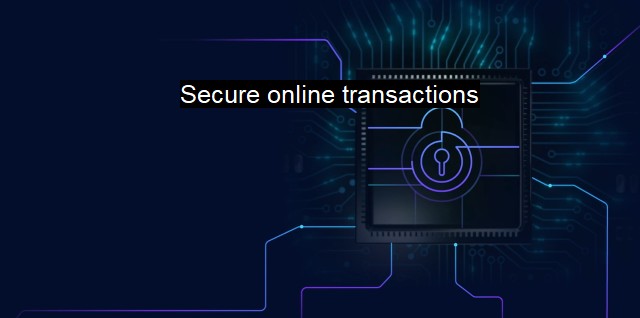What are Secure online transactions?
The Importance of Secure Online Transactions in the Age of Cybercrime: An Introduction to Cybersecurity and Antivirus Systems
Secure online transactions are fundamental pillars in the digitized world of global trade where monetary dealings take place over the internet, involving activities like online shopping, bill payments, banking processes, and many more. The increasing prevalence of digital technology has led to a surge in online transactions. While these transactions offer unprecedented convenience, they're also susceptible to cyber threats, making cybersecurity a critical aspect one can't overlook.In simple terms, a secure online transaction indicates a process where the information exchanged between a user and a website is encrypted, preventing unauthorized access or theft. Ensuring the security and confidentiality of personal and financial data has, therefore, become substantial for every individual and business engaged in online transactions.
From a cybersecurity perspective, secure online transactions rely heavily on a multitude of protection measures and methods. These measures are designed to fortify the sensitive interchange from the reach of cyber-criminals aiming to pilfer that vital piece of information. Practices and safety protocols such as secure sockets layer (SSL) technology, tokenization and encryption, two-factor authentication, and one-time passwords (OTP) massively protect safe online transactions, making it difficult for imposters to extract user information.
Encryption is paramount when conducting secure online transactions to prevent unauthorized interlopers from accessing the data transferred. Online banking uses end-to-end encryption to shield transactions and account information from cyber threats. When data is encrypted, it's converted into an incomprehensible format that can only be deciphered using a specific decryption key.
Partaking in secure online transactions also necessitates vigilance from the users' end. They are advised to only conduct transactions from devices that have a good, updated antivirus software system configured. Antivirus software acts as a digital guardian, safeguarding the users' devices against various forms of cyber threats like viruses, worms, ransomware, and more. It guards against potentially harmful programs that strive to infiltrate the device and steal personal or financial information.
Users should be cognizant about using their best judgment while executing online transactions. For instance, not clicking on suspicious links and only visiting websites or platforms that have trusted security mechanisms. Enhanced user education on this front is crucial, remembering that secure transactions are an equal responsibility.
Another component of security for online transactions is the transport layer security (TLS) protocol that provides privacy and data security between applications and users on the internet. Once a server and client computer have recognized each other via a TLS handshake, the session is encrypted and protected from tampering or eavesdropping.
Numerous governing bodies and regulations contribute to secure online transactions. Payment Card Industry Data Security Standard (PCI DSS) regulates businesses that deal with debit, credit, prepaid, e-purse, ATM, and POS cards, emphasizing the safeguarding of cardholder details.
Anywhere money goes, fraudsters follow, so having secure online transactions is of paramount importance. It’s crucial for individuals and businesses alike to stay vigilant and adhere to simple cybersecurity practices. Further investing in robust security solutions and antivirus software, understanding the value of encryption, thorough security checks are all prerequisites in establishing a secure online transaction environment. Emphasizing these areas can ensure one's digital financial engagements remain relatively risk-free and protected.
Ongoing evolution in cybersecurity methods is continually redefining what promising safety entails. Further developments are expected in everything from encryption strategies to user authentication and protection protocols. So, it becomes pivotal to abreast of the latest security measures for fortifying online transactions and keep up with the pace of the ever-evolving digital landscape. After all, the hard truth is, cybersecurity is a continuously evolving landscape, where predicting threats becomes as up-to-date as discovering the vulnerabilities.

Secure online transactions FAQs
What is a secure online transaction?
A secure online transaction is a transaction that is protected from cyber threats such as hacking or fraud. It is conducted over a secure network and encrypted to ensure the information exchanged between parties is not compromised.What are the benefits of using antivirus software for secure online transactions?
Antivirus software can help protect your device and personal information from malware that can compromise your security during an online transaction. It can detect and remove malicious software, block phishing attempts, and prevent unauthorized access to your information.What are some best practices for ensuring secure online transactions?
Some best practices include using strong and unique passwords for your accounts, verifying the authenticity of the website before entering sensitive information, avoiding public Wi-Fi networks, regularly updating your software and operating system, and monitoring your bank accounts for any suspicious activity.What should I do if I suspect my online transaction may have been compromised?
If you suspect that your online transaction may have been compromised, immediately contact your bank or credit card company to report the issue and request a freeze on your account. Change your login credentials for your account and monitor your bank statements for any unauthorized charges.| | A | | | B | | | C | | | D | | | E | | | F | | | G | | | H | | | I | | | J | | | K | | | L | | | M | |
| | N | | | O | | | P | | | Q | | | R | | | S | | | T | | | U | | | V | | | W | | | X | | | Y | | | Z | |
| | 1 | | | 2 | | | 3 | | | 4 | | | 7 | | | 8 | | |||||||